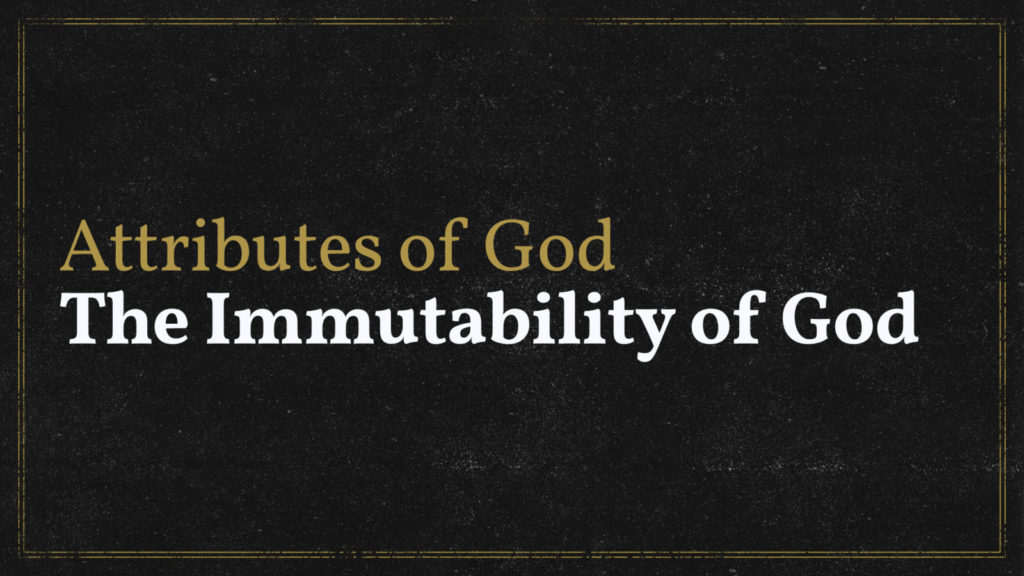Within the nature of God there is a quality, sometimes called an attribute, that can be hard to comprehend—His immutability.
As the Westminster Confession of Faith states, “God is unchangeable, being the same yesterday, today, and forever” (WCF Ch. II). That is to say, He is not subject to any kind of alteration or transformation. He is the same in His character, nature, and purpose, regardless of time and circumstances.

At a human level, it can be hard to comprehend the immutability of God, due to our very nature as finite and ever-changing creatures. After all, our whims, feelings, and emotions, drive us to constant change; and to remain unmoved or unchanged by anything, seems almost inhuman. But, it is precisely that difference, which makes God so unique and special. His absoluteness is a great source of comfort and strength for us who desire to remain in His presence.
The Bible is rich with passages that speak of God’s unchangeability. For example, the Psalmist declares, “For I the Lord do not change” (Malachi 3:6, KJV). And Hebrews 13:8 also declares, “Jesus Christ is the same yesterday, today and forever”. These verses demonstrate that, no matter what life brings, God remains the same.
“Jesus Christ is the same yesterday, today and forever”
Augustine of Hippo expressed this idea in his Confessions, writing “O Lord, thy years endure through all generations: thou remainest, and thy years shall have no end” (Book XI, Ch. VI). By emphasizing the eternity of God, he reminds us that we can find refuge and trust in His immutability. The immutability of God also has profound implications for our faith. In his book Institutes of the Christian Religion, John Calvin was clear on the fact that without God’s unchangeability, it would be impossible to have an enduring relationship with Him. He states, “The unchangeableness of God is the foundation of all piety and the stability of the church” (Book I, Ch. XI, Section VII).
In other words, if God were to constantly change in His character, will, and purpose, we would not be able to trust nor depend on Him. Being able to rest assured in His unchanging nature is what brings us stability, assurance, and peace. The immutability of God is also a reminder of His infinite love for us.
In other words, if God were to constantly change in His character, will, and purpose, we would not be able to trust nor depend on Him.
Thomas Aquinas said, “God is not moved by love or hate. He is simply the one who is immutable, ever the same” (Summa Theologiae, I, Q.22, A. 5). This is to say that we can be sure of His love, no matter the circumstances. He will never change in His ultimate love for us, because He is beyond any kind of change. Moreover, God’s immutability means that He will remain faithful to His promises. The Westminster Shorter Catechism says that He is “a God of truth and without iniquity, just and right is He” (Q.20).
In other words, even when everything else changes, God remains the same. We can trust that He will keep His Word, regardless of time and circumstances. Ultimately, our faith is strengthened when we recognize the immutability of God. It humbles us, fills us with peace, and encourages us to love Him even more. As the Heidelberg Catechism states, “Our comfort and hope is this, that He is God, who cannot lie or deceive us, but faithfully performs all that He has promised” (Q.21).
It is for this reason that we should always strive to remain close to God, so we may bask in the security and comfort of His immutable love. Jonathan Edwards wrote in his book Freedom of the Will, “Let us adore the immutability of the Divine nature, and bless Him that He is what He is, and that He sits on His throne, an unchangeable, infinite, and eternal being” (Ch. IV).
May we all be granted the faith to respond to His unfailing love and mercy and turn to Him with all our hearts, minds, and souls, to praise this unchangeable God who loves us so. May it please the Lord God Almighty to help us love our neighbors, enemies, and him,- with hearts and minds seeing the beauty of holiness in his creation.
What Does Scripture Say
- Malachi 3:6a “For I am the Lord, I change not;”
- Numbers 23:19a “God is not a man, that he should lie;”
- Psalm 33:11a “The counsel of the Lord standeth for ever,”
- Hebrews 13:8a “Jesus Christ the same yesterday, and to day, and for ever.”
- James 1:17a “Every good gift and every perfect gift is from above, and cometh down from the Father of lights, with whom is no variableness, neither shadow of turning.”
- Psalm 102:25-27 “Of old hast thou laid the foundation of the earth: and the heavens are the work of thy hands. They shall perish, but thou shalt endure: yea, all of them shall wax old like a garment; as a vesture shalt thou change them, and they shall be changed: But thou art the same, and thy years shall have no end.”
- Romans 11:29 “For the gifts and calling of God are without repentance.”
- 1 Corinthians 15:52 “In a moment, in the twinkling of an eye, at the last trump: for the trumpet shall sound, and the dead shall be raised incorruptible, and we shall be changed.”
- Deuteronomy 4:31-32 “(For the Lord thy God is a merciful God;) he will not forsake thee, neither destroy thee, nor forget the covenant of thy fathers which he sware unto them. For ask now of the days that are past, which were before thee, since the day that God created man upon the earth, and ask from the one side of heaven unto the other, whether there hath been any such thing as this great thing is, or hath been heard like it?”
- Deuteronomy 32:4 “He is the Rock, his work is perfect: for all his ways are judgment: a God of truth and without iniquity, just and right is he.”
These verses clearly show that God never changes and that his character is perfect, unchanging, and just. In his immutability, God is faithful and true to his promises.
What Did the Reformers and Confessions Say
The great theologians throughout history have also affirmed the immutability of God. Augustine of Hippo wrote, “He Himself is at rest in His own immutable truth, and all temporal things find rest in Him.” Thomas Aquinas noted that “God is unchangeable in Himself” and “His nature remains necessarily the same.” William Tyndale wrote that God “doth not alter, nor move, nor vari” his purposes. Martin Luther wrote, “Nothing of all that God does or wills, ever changes, nor can it change in any way.”
Huldrych Zwingli taught that “God is the same, unchangeable in His being, His nature, His counsel, His word, and His works.” John Calvin wrote, “The unchangeableness of God’s nature, His counsel, and His promises, must be carefully attended to.” John Knox declared, “Thou art God and changest not.” Theodore Beza wrote, “God is an immutable Being, and nothing happens which is beyond His measure and the boundaries He has prescribed.”
Francis Turretin noted that “God is not only immutable in Himself, but also in His counsel and works.” John Owen wrote, “This unchangeableness of God’s being, nature, counsel, and declarations, is essential to the faith of all that worship Him.” Richard Baxter declared, “God is immutable as He is eternal, and as we must believe it to salvation.” John Bunyan wrote, “God changeth not, God tempteth not, God hurrieth not, God is unchangeable, God is infallible.”
Jonathan Edwards taught, “God’s immutability is one of the fundamental doctrines of the gospel.” Charles Hodge wrote, “God is immutable, and therefore His perfections are eternally the same.” Charles Haddon Spurgeon said, “God is immutable; no change ever takes place with Him; He is one and the same yesterday, today, and forever.” Abraham Kuyper noted, “The changelessness of the Lord is absolute.”
Herman Bavinck wrote, “God alone is immutable. He alone is not subject to any change.”
Herman Bavinck wrote, “God alone is immutable. He alone is not subject to any change.” J. Gresham Machen declared, “God’s immutability is one of the most striking of all His attributes.” Cornelius Van Til taught, “God is immutable in all His attributes. He does not change in being, knowledge, or will.” Francis Schaeffer noted, “God is absolutely immutable in all His attributes.”
This immutability of God is also seen in the Reformed Confessions. The Scots Confession declares that God is “unchangeable, and His will immutable.” The Belgic Confession teaches that “He is always like Himself,” and “His years shall have no end.” The Heidelberg Catechism states, “He changeth not, and therefore His counsel standeth for ever.”
The 39 Articles of Religion affirm that God “cannot deny Himself,” and “He is in one person, immutable.” The Second Helvetic Confession declares that God’s “decrees are unalterable” and “His truth and faithfulness fail not.” The Synod of Dort’s Judgment on the Five Articles of Remonstrance asserts, “God does not change nor become different.” The Canons of Dort teach that “God is unchangeable.”
The Irish Articles declare that “God is unchangeable and eternal,” and “His counsel shall stand and He will do all his pleasure.” The Westminster Confession of Faith states, “God is unchangeable in His nature, counsels, and purpose.” The Westminster Shorter and Larger Catechisms both affirm that God is “unchangeable.”
The Savoy Declaration teaches that God is “unchangeable in his nature, wisdom, power, justice, goodness, and truth.” The Baptist Catechism affirms, “God is unchangeable, or the same yesterday, and today, and forever.” The New England Confession states, “God is unchangeable in his nature, perfections, and promises.” The Philadelphia Confession states, “God is unchangeable in his being, wisdom, power, holiness, justice, goodness and truth.”
These Scriptures, theologians, and Reformed Confessions, all declare and or confess God is immutable and that his character is perfect, unchanging, and just. God cannot change and he never fails to keep his promises. His unchangeableness is an assurance of his love and grace, and a constant reminder of his faithfulness and reliability.

